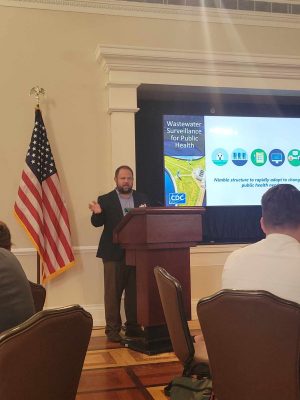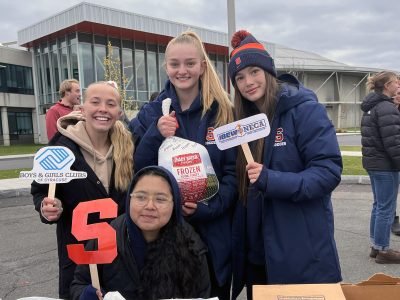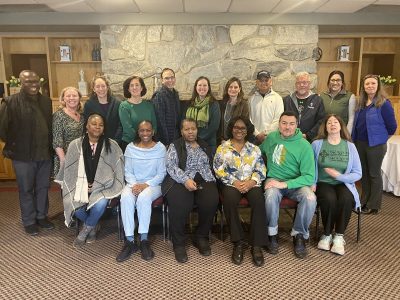Public Health Professor David Larsen Invited to White House to Discuss Wastewater Surveillance
It’s not easy to condense about four years of research into two minutes, but that’s exactly what Syracuse University Public Health Professor David Larsen did during a visit to the White House on Aug. 27.
Larsen, Chair of the Department of Public Health in Syracuse’s Falk College of Sport and Human Dynamics, was invited to present to a panel of scientists, policymakers and policy implementers at an information-gathering event called the “White House Roundtable on Emerging Technologies for Preventing Health Emergencies.” At the onset of COVID in 2020, Larsen spearheaded an interdisciplinary team of experts in coordination with the New York State Department of Health to create a wastewater surveillance system throughout New York State.
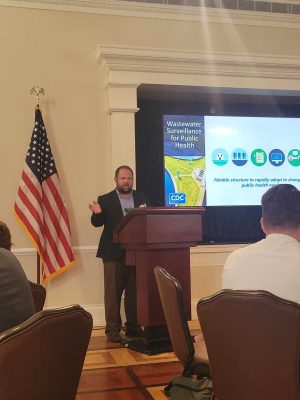
As one of many presenters during the three-hour roundtable, Larsen was given two minutes to discuss the merits of testing wastewater for COVID-19 and other infectious diseases.
“It was quite humbling to receive the invitation,” Larsen says. “I always hope that my work can influence public health, and since COVID-19, I’ve been trying to support the improvement of our infectious disease surveillance systems in New York State and this country.”
Today, the New York State Wastewater Surveillance Network is testing for COVID in at least one wastewater treatment plant in all 62 of the state’s counties, covering a population of 15.4 million. The New York State Wastewater Surveillance Network dashboard provides the most recent statistics regarding the network.
Days before Larsen’s trip to Washington, D.C., the Centers for Disease Control and Prevention (CDC) named the New York State Department of Health Wastewater Surveillance Program as a new Center of Excellence in the National Wastewater Surveillance System. New York’s system was recognized by the CDC for its exemplary performance in the early detection and monitoring of communicable diseases such as COVID-19, polio, influenza and more.
This past spring, Larsen received a prestigious Fulbright U.S. Scholar Award to teach and continue his wastewater surveillance research at the Medical University of Innsbruck in Austria.
Larsen is clearly a leading expert in this field and he received the invitation to speak at the White House from Nicole Fehrenbach, the Branch Chief of the Rapid Response Research and Surveillance Branch of the CDC. The CDC is intimately familiar with Larsen’s work as the New York State Wastewater Surveillance Network is a part of the CDC’s National Wastewater Surveillance System.
Larsen had visited Washington, D.C., before Aug. 27 and saw the White House from the outside, but he had never been in the complex until he attended the roundtable hosted by the White House Office of Science and Technology in the Eisenhower Executive Office Building.
“Walking into the Eisenhower Office Building and seeing the offices of the Chief of Staff and other executive officials and the west wing of the White House was a bit surreal,” Larsen says. “It was the culmination of a lot of hard work since March of 2020.”
During his “lightning talk,” Larsen says he emphasized that the functions of infectious disease surveillance are two-fold. First, they need to alert us when a community is at increased risk,” he told the panel. “And second, they need to confirm a community is no longer at risk.”
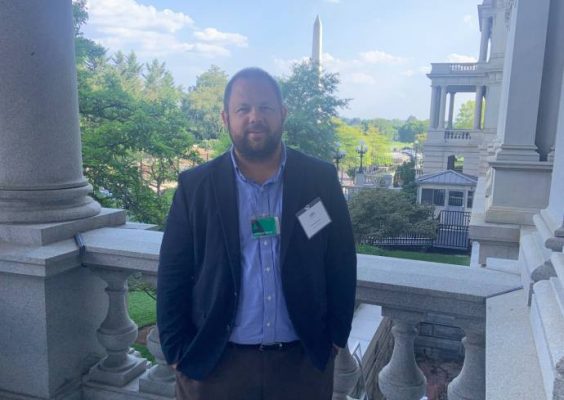
“The Covid-19 pandemic showed how inadequately our systems performed in these two functions,” he added. “So, improvements are needed. Wastewater is a great way for both of these, and perhaps one of the most cost-effective ways to confirm a community is not at risk.”
Larsen says his remarks were “well received,” although he can’t share specific reactions because of the privacy guidelines for the roundtable. He’s encouraged that panelists were responsive because of the looming funding needs for wastewater surveillance.
“Right now, wastewater surveillance in the U.S. is largely being funded by COVID-19 emergency funds,” Larsen says. “As the emergency is over, those funds will expire. I hope that future funding will be made available to continue these efforts.”
Those efforts, which started on the campus of Syracuse University and now extend worldwide, will continue at Syracuse with Larsen leading the way.
“Right now, my team at Syracuse is focused on transitioning the operations of the program we’ve built in New York over to the State Department of Health,” he says. “That will allow us to dive deeper into the science and maximize the benefits of the systems.
“With the newly awarded Center of Excellence, we will support other states in the region, Puerto Rico and the U.S. Virgin Islands,” he adds. “And then globally, the Europeans are leading an effort to coordinate global wastewater surveillance and we’ll continue to support those efforts.”
